MOSCOW (Reuters) – Russian artist Alyona Kazinskaya likes to fill her social media feed with cheerful messages and vivid floral paintings. For 30 minutes last Friday night, it turned into a timeline of terror.
Kazinskaya and a friend had bought last-minute tickets to see Soviet-era rock group “Picnic” perform in front of 6,200 people at a concert hall near Moscow. They thought about taking their daughters but decided to go by themselves.
It was at 8:01 p.m. that Kazinskaya posted a first 10-second audio message on her Telegram channel, sounding breathless and frightened as loud bursts of gunfire rang out.
“I love you all. I’m in Crocus City Hall – Picnic. They’re shooting here, at the concert. I’m in the hall. Call the police.”
As four Kalashnikov-toting gunmen rampaged through the building, spraying concertgoers with bullets, Kazinskaya found herself caught up in the deadliest attack on Russia for 20 years.
As of Thursday, 143 people were confirmed killed in the massacre, which has been claimed by Islamic State militants but which Russia is attempting – despite emphatic denials from Kyiv – to link to Ukraine.
In an interview with Reuters, Kazinskaya said she understood quickly that the sounds she was hearing were gunshots, not special effects. With her friend, she tried to get the people around them to leave their seats and run.
“We tried to get people up, we got them up, but people had already run to the exit and we couldn’t get through. At that moment they (the gunmen) entered the hall. Then I threw my friend to the floor and I said ‘let’s crawl’.”
SCRAMBLED MESSAGES
Her first thought, Kazinskaya said, was to get out of the hall, at any price. “My second thought was I’m wearing white, I’m a good target.”
She paused briefly, and laughed.
“And finally, the third thought was I’m going to write something now – yes I’m frightened but I’m going to put these messages in my (Telegram) channel because that way someone, somewhere will definitely hear them, find them and call someone.”
At 8:08 p.m. she wrote three messages in quick succession, scrambling the letters as her fingers trembled on the phone.
“Please ring the police!!!!!”
“Crocus City Hall”
“Shooting”
By now, the pair of them had escaped the hall but was still trapped inside the building. The shooting stopped, but now there was another hazard.
8:17 p.m. A one-word audio message. “Fire!”
The gunmen had used gasoline to set the huge concert hall ablaze. The two friends took refuge in a toilet. There was smoke everywhere. They tried half a dozen times to get out, but they couldn’t see anything and had to keep retreating.
Kazinskaya was losing hope.
At 8:23 p.m. she left a four-second audio message she thought would be the last one.
“I love you. Goodbye.”
Disorientated, the pair of them found themselves in another toilet where more people were hiding. There was a man there who said he thought he could find a way out. They followed him and managed to escape the building – but even then, Kazinskaya did not feel safe.
“I had only two thoughts. First, I need first aid because I can’t breathe. I had burning to my lungs, and an asthma attack. And the second thought was I have to get as far away from the building as I can.”
At 8:31 p.m. she left a new audio message. “I’m alive. I’m getting first aid. I got out. Thank you.”
Returning home, Kazinskaya says she just “hugged everyone”. Now, she says, it will be a long time before she goes to clubs or big concerts again. But she draws comfort from the amount of support she has received.
“I think society itself needs to be kinder,” she said. “Because we remember we’re human when something bad happens, but we need to be human every day.”
(Reporting by Reuters; Witing by Mark Trevelyan; Editing by Alison Williams)
